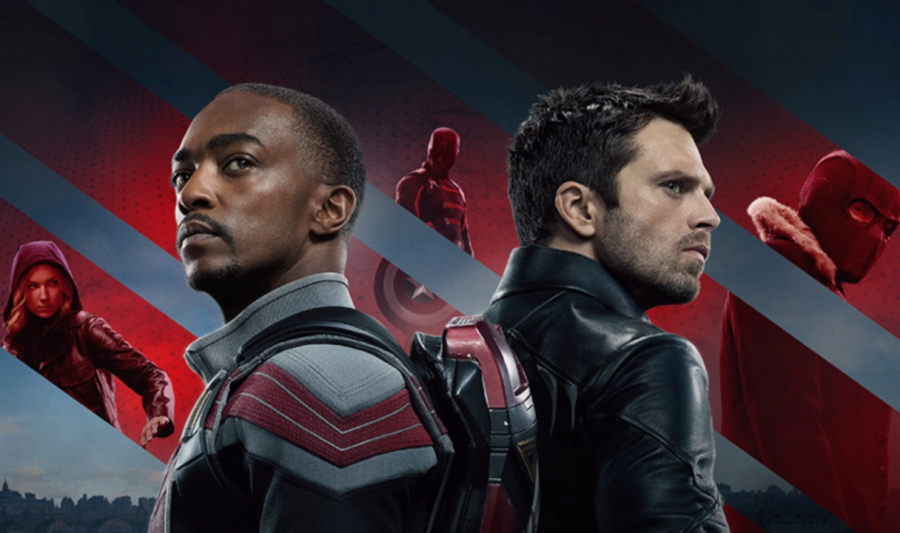Marvel’s Social Commentary Through Its Latest TV Series
“The Falcon and Winter Soldier” is the latest edition to the Marvel universe.
April 21, 2021
Admittedly, when Marvel Studios first announced over a year ago its slate of upcoming projects, I was cautiously optimistic. The Marvel Cinematic Universe had just culminated its more than decade-long narrative with “Avengers: Endgame,” an unprecedented movie that will no doubt be recognized as a staple of the superhero genre. While “Spider-Man: Far From Home” was released a few months later, there had begun to be a sense of fatigue from a sizable amount of fans –– myself included –– since the previous years had as much as three movies annually in theaters. Luckily, Marvel chose to take a year hiatus, which would end up being extended due to the COVID-19 pandemic. Still, I was still skeptical about how it would continue to keep me engaged but still eager at the prospect of new TV shows. I can safely say that my skepticism was unfounded as “The Falcon and the Winter Soldier” has managed to intrigue me in ways other than just continuing the stories of two Avengers.
After the finale of the MCU’s debut show “Wandavision,” I was left thoroughly pleased with the series and wondered if the upcoming show about Avengers Sam Wilson and Bucky Barnes –– whom I personally was indifferent to previously –– would be able to live up to the standard that was set. I am pleased to say that it certainly does but in a different way, as the ongoing show chooses to focus on a real-world issue that had not been present in this fashion beforehand: racial injustice.
The series starts off with Wilson struggling with fulfilling his friend’s hope for taking the mantle as his successor. He decides to decline the proposition and proceeds to give Captain America’s iconic shield to the government. Initially, viewers are led to believe that the main reason for this decision was his insecurity of living up to the legacy that Steve Rogers left behind with the shield. However, as the show progresses, we learn more about the history of the shield as the story introduces us to Isaiah Bradley, an African American Korean War veteran who had been given the Super Soldier Serum in the 1950s, similar to Rogers. He used this power to later save prisoners of war. Unlike Rogers, however, he was not praised as a symbol of America due to racial prejudices that plagued the country during that time and instead was held captive by the U.S. government for this action in order for them to experiment on him to see why the serum was effective on him. He was imprisoned for 30 years before being freed and was then relocated to Baltimore having been declared legally dead by the government to cover their tracks. Without going into more details about the show, he was clearly capable of being the next Captain America but was ultimately stripped of this chance on the account of the color of his skin. As a result, he has remained secluded from the public eye living in resentment for the government he pledged his loyalty to in a time when a hero was desperately needed.
Wilson, despite being an Avenger, had also been subjected to racial discrimination in his lifetime as an African American, which makes this story way more emotionally impactful. The show manages to convey the idea that even superheroes aren’t immune to the enemy that is racism and manages to add a layer of depth that I never expected a show like this to take –– and I love it. It adds more complexity to the main character in a way that feels mostly natural while cleverly addressing issues in the nation today with the recent police killings and overarching issue of racism that have sadly been prominent in recent years.
When talking to Wilson, Bradley said, “You think things are different? You think times are different?” This statement makes Wilson, myself and likely many other views reflect upon the history of the country and how like the shield, it has a complicated and rather dark past. Wilson’s hesitation to be the next “Captain America” becomes a more understandable conflict as not only does he feel he cannot fill his best friend’s shoes, but also he wonders if the world is ready for a black iteration of the “symbol of hope” and whether the nation would even accept him. This show is not without its flaws but portrays one of the strongest character arcs in the MCU and is definitely worth a watch. While the show will release its series finale this Friday on Disney+, I want Wilson to end up taking on the mantle as the next Captain America not only because I feel he is more than worthy of the position, but I see him as a symbol of hope that the country has genuinely learned from its past and on the path towards positive change.










